| Listing 1 - 10 of 12 | << page >> |
Sort by
|
Book
ISBN: 023750023X 0237500221 Year: 1978 Publisher: London Evans
Abstract | Keywords | Export | Availability | Bookmark
 Loading...
Loading...Choose an application
- Reference Manager
- EndNote
- RefWorks (Direct export to RefWorks)
Soyinka, Wole --- Criticism and interpretation. --- Nigeria --- In literature. --- شوينكا، وولي --- 渥雷・索因卡 --- Shoĭinka, Vole --- Soyinka, Akinwande Oluwole --- Wolei Suoyinka
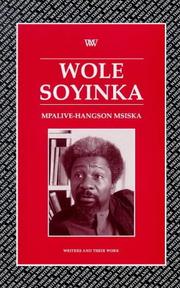
ISBN: 0746308116 0746308167 1786946297 Year: 1998 Publisher: Plymouth : Northcote House,
Abstract | Keywords | Export | Availability | Bookmark
 Loading...
Loading...Choose an application
- Reference Manager
- EndNote
- RefWorks (Direct export to RefWorks)
The book reconsiders Soyinka's contribution to the debate about African identity, exploring the various elements constituting his distinctive aesthetic and apprehension of African culture. It concentrates on his plays, his fiction and poetry and investigates his views on the relationship between myth, history, and modernity, primarily highlighting his conception of the nature of African post-colonial society and power. Also, the book looks at Soyinka's exploration of the metaphysical aspects of evil, particularly as manifested in political violence, and, in addition, it examines his belief in the irrepressibility of the human desire to transcend any form of political, spiritual and social oppression. Finally, it argues that Soyinka's major contribution to our understanding of contemporary African life and art lies in his attempts to move beyond the idea of identity as an opposition between Self and Other to a conception of identity in which such concepts are either themselves questioned or transferred to a different frame or language where they are made to signify differently.
Soyinka, Wole --- Criticism and interpretation. --- شوينكا، وولي --- 渥雷・索因卡 --- Shoĭinka, Vole --- Soyinka, Akinwande Oluwole --- Wolei Suoyinka --- Soyinka, Wole (1934-....) --- Critique et interprétation
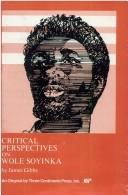
ISBN: 0914478508 0914478494 Year: 1980 Publisher: Washington : Three Continents Press,
Abstract | Keywords | Export | Availability | Bookmark
 Loading...
Loading...Choose an application
- Reference Manager
- EndNote
- RefWorks (Direct export to RefWorks)
Soyinka, Wole --- Criticism and interpretation. --- Nigeria --- In literature. --- شوينكا، وولي --- 渥雷・索因卡 --- Shoĭinka, Vole --- Soyinka, Akinwande Oluwole --- Wolei Suoyinka --- Littérature africaine --- Littérature africaine --- Soyinka (wole), 1934 --- -Soyinka (wole), 1934 --- -Soyinka, Wole --- -Soyinka (wole), 1934-
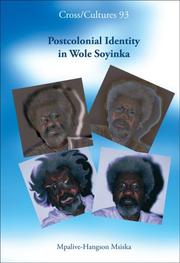
ISBN: 9042022582 9789042022584 9004358129 9789004358126 Year: 2007 Publisher: Amsterdam ;New York, NY Rodopi
Abstract | Keywords | Export | Availability | Bookmark
 Loading...
Loading...Choose an application
- Reference Manager
- EndNote
- RefWorks (Direct export to RefWorks)
Soyinka’s representation of postcolonial African identity is re-examined in the light of his major plays, novels and poetry to show how this writer’s idiom of cultural authenticity both embraces hybridity and defines itself as specific and particular. For Soyinka, such authenticity involves recovering tradition and inserting it in postcolonial modernity to facilitate transformative moral and political justice. The past can be both our enabling future and our nemesis. In a distinctive approach grounded in cultural studies, Postcolonial Identity in Wole Soyinka locates the artist’s intellectual and political concerns within the broader field of postcolonial cultural theory, arguing that, although ostensibly distant from mainstream theory, Soyinka focuses on fundamental questions concerning international culture and political identity formations – the relationship between myth and history / tradition and modernity, and the unresolved tension between power as a force for good or evil. Soyinka’s treatment of the relationship between individual selfhood and the various framing social and collective identities, so the book argues, is yet another aspect linking his work to the broader intellectual currents of today. Thus, Soyinka’s vision is seen as central to contemporary efforts to grasp the nature of modernity. His works conceptualize identity in ways that promote and modify national perceptions of ‘Africanness’, rescuing them from the colonial and neocolonial logic of cultural denigration in a manner that fully acknowledges the cosmopolitan and global contexts of African postcolonial formation. Overall, what emerges from the present study is the conviction that, in Soyinka’s work, it is the capacity to assume personal and collective agency and the particular choices made by particular subjects at given historical moments that determine the trajectory of change and ultimately the nature of postcolonial existence itself. Postcolonial Identity in Wole Soyinka is a major and imaginative contribution to the study of Wole Soyinka, African literature, and postcolonial cultural theory and one in which writing and creativity stand in fruitful symbiosis with the critical sense. It should appeal to Soyinka scholars, to students of African literature, and to anyone interested in postcolonial and cultural theory.
Postcolonialism in literature. --- Political and social views. --- Soyinka, Wole --- Soyinka, Wole. --- Shoĭinka, Vole --- Soyinka, Akinwande Oluwole --- Wolei Suoyinka --- شوينكا، وولي --- 渥雷・索因卡 --- Criticism and interpretation. --- Political and social views of a person
Book
ISBN: 0333305272 0333305280 9780333305270 9780333305287 Year: 1986 Publisher: Houndmills: MacMillan,
Abstract | Keywords | Export | Availability | Bookmark
 Loading...
Loading...Choose an application
- Reference Manager
- EndNote
- RefWorks (Direct export to RefWorks)
820 <100> SOYINKA --- Engelse literatuur: Commonwealth--SOYINKA --- -شوينكا، وولي --- 渥雷・索因卡 --- Shoĭinka, Vole --- Soyinka, Akinwande Oluwole --- Wolei Suoyinka --- 820 <100> SOYINKA Engelse literatuur: Commonwealth--SOYINKA --- Soyinka, Wole --- شوينكا، وولي --- Dramatic works. --- Nigeria --- In literature. --- Dramatic works --- In literature --- Soyinka, Wole - Dramatic works --- Nigeria - In literature --- Soyinka (wole), 1934 --- -Soyinka, Wole --- -Soyinka (wole), 1934
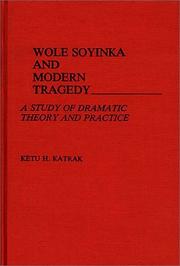
ISBN: 0313240744 Year: 1986 Publisher: New York (N.Y.) : Greenwood press,
Abstract | Keywords | Export | Availability | Bookmark
 Loading...
Loading...Choose an application
- Reference Manager
- EndNote
- RefWorks (Direct export to RefWorks)
African literature --- Soyinka, Wole --- 820 "19" SOYINKA, WOLE --- Tragedy --- Yoruba (African people) in literature --- Drama --- Engelse literatuur--20e eeuw. Periode 1900-1999--SOYINKA, WOLE --- -شوينكا، وولي --- 渥雷・索因卡 --- Shoĭinka, Vole --- Soyinka, Akinwande Oluwole --- Wolei Suoyinka --- Tragedies --- Nigeria --- In literature. --- Tragedy. --- Yoruba (African people) in literature. --- -Tragedies --- 820 "19" SOYINKA, WOLE Engelse literatuur--20e eeuw. Periode 1900-1999--SOYINKA, WOLE --- شوينكا، وولي --- Tragedies. --- Soyinka (wole), 1934 --- -Tragedy. --- -Soyinka (wole), 1934 --- -Tragedy --- -African literature
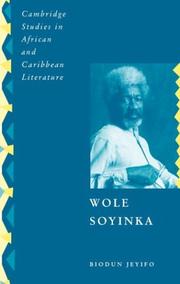
ISBN: 0521394864 0521110734 0511097840 1107126452 0511116004 0511065388 0511308310 0511486596 1280162317 0511205406 0511067518 9780511065385 9780511116001 9780511486593 9780511067518 9781280162312 9780521394864 9780521676526 0521676525 9780521110730 Year: 2004 Volume: *8 Publisher: Cambridge Cambridge University Press
Abstract | Keywords | Export | Availability | Bookmark
 Loading...
Loading...Choose an application
- Reference Manager
- EndNote
- RefWorks (Direct export to RefWorks)
Biodun Jeyifo examines the connections between the innovative and influential writings of Wole Soyinka and his radical political activism. Jeyifo carries out detailed analyses of Soyinka's most ambitious works, relating them to the controversies generated by Soyinka's use of literature and theatre for radical political purposes. He gives a fascinating account of the profound but paradoxical affinities and misgivings Soyinka has felt about the significance of the avant-garde movements of the twentieth century. Jeyifo also explores Soyinka's works with regard to the impact on his artistic sensibilities of the pervasiveness of representational ambiguity and linguistic exuberance in Yoruba culture. The analyses and evaluations of this study are presented in the context of Soyinka's sustained engagement with the violence of collective experience in post-independence, postcolonial Africa and the developing world. No existing study of Soyinka's works and career has attempted such a systematic investigation of their complex relationship to politics.
Politics and literature --- Postcolonialism in literature. --- Postcolonialism --- Arts and Humanities --- Language & Linguistics --- Soyinka, Wole --- Criticism and interpretation. --- Political and social views. --- Nigeria --- In literature. --- Post-colonialism --- Postcolonial theory --- Political science --- Decolonization --- Literature --- Literature and politics --- Political aspects --- شوينكا، وولي --- 渥雷・索因卡 --- Shoĭinka, Vole --- Soyinka, Akinwande Oluwole --- Wolei Suoyinka --- SOYINKA (WOLE), 1934 --- -POLITIQUE ET LITTERATURE --- POSTCOLONIALISME --- Postcolonialisme --- NIGERIA --- PENSEE POLITIQUE ET SOCALE --- Dans la littérature --- DANS LA LITTERATURE
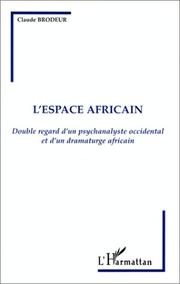
ISBN: 2738458807 9782738458803 Year: 1997 Publisher: Paris : L'Harmattan,
Abstract | Keywords | Export | Availability | Bookmark
 Loading...
Loading...Choose an application
- Reference Manager
- EndNote
- RefWorks (Direct export to RefWorks)
Un psychanalyste, éclairé par des échanges nombreux avec un anthropologue, se pose la question très actuelle du rapport difficile de l'Afrique contemporaine avec la culture et le monde moderne : la rencontre des traditions anciennes et de la civilisation occidentale, une approche nouvelle des institutions démocratiques, un accès original à la science et à la religion. Au cours de ses interrogations, il trouve, dans l'oeuvre d'un dramaturge africain, Wole Soyinka (prix Nobel de littérature en 1987), un interlocuteur honnête, parfois violent, toujours sincère.Analyse de : La mort et l'écuyer du roi - La route - Les Bacchantes d'Euripide - La danse de la forêt - Les gens des marais
Psychology in literature --- Nigerian drama (English) --- Psychoanalysis and literature --- Psychological aspects --- Soyinka, Wole --- Knowledge --- Psychology --- Dramatic works --- #SBIB:39A9 --- #SBIB:39A73 --- -Psychoanalysis and literature --- -Psychology in literature --- Psychology as a theme in literature --- Literature and psychoanalysis --- Psychoanalytic literary criticism --- Literature --- English drama --- Nigerian literature (English) --- Medische antropologie / gezondheid / handicaps --- Etnografie: Afrika --- -Soyinka, Wole --- -شوينكا، وولي --- 渥雷・索因卡 --- Shoĭinka, Vole --- Soyinka, Akinwande Oluwole --- Wolei Suoyinka --- -Psychology --- -Dramatic works --- شوينكا، وولي --- Dramatic works. --- Psychology. --- Nigerian drama (English) - Psychological aspects --- Psychoanalysis and literature - Nigeria --- Soyinka, Wole - Knowledge - Psychology --- Soyinka, Wole - Dramatic works --- Afrique --- Culture --- Psychanalyse --- Anthropologie --- Théâtre --- Analyse théâtrale --- Psychology in literature. --- Psychological aspects.
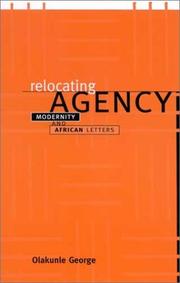
ISBN: 0791487768 9780791487761 9780791455425 0791455424 0791455416 0791455424 9780791455418 Year: 2003 Publisher: Albany : State University of New York Press,
Abstract | Keywords | Export | Availability | Bookmark
 Loading...
Loading...Choose an application
- Reference Manager
- EndNote
- RefWorks (Direct export to RefWorks)
2003 CHOICE Outstanding Academic TitleCombining a sustained critical engagement of Anglo-American theory with focused close-readings of major African writers, this book performs a long-overdue cross-fertilization of ideas among poststructuralism, postcolonial theory, and African literature. The author examines several influential figures in current theory such as Habermas, Althusser, Laclau and Mouffe, as well as the theorists of postcolonialism, and offers an extended reading of the Nigerian writers D.O. Fagunwa, Wole Soyinka, Amos Tutuola, and Chinua Achebe. He argues that contrary to what the purism and voluntarism common to postcolonial theory might suggest, one lesson of African letters is that significant agency can result from acts that are blind to their determinations. For George, African letters offer an instance of "agency-in-motion," as opposed to agency in theory.
African literature (English) --- Literature and society --- Agent (Philosophy) in literature. --- Decolonization in literature. --- Poststructuralism --- Postcolonialism --- Post-structuralism --- Philosophy, Modern --- Structuralism --- Literature --- Literature and sociology --- Society and literature --- Sociology and literature --- Sociolinguistics --- History and criticism. --- History --- Social aspects --- Achebe, Chinua --- Fagunwa, D. O. --- Soyinka, Wole --- Tutuola, Amos --- Fagunwa, Daniel O. --- Fagunwa, Daniel Orowole --- Fagunwa, Daniel Orowole Olorunfẹmi --- Achebe, Albert Chinua --- Achebe, Chinualumogu Albert --- Ats'ebeh, Ts'inuʼa --- Acībī, Cinūā --- Achebe, Albert Chinualumogu --- אצ׳בה, צ׳ינוא --- أتشينى، شينوا --- شوينكا، وولي --- 渥雷・索因卡 --- Shoĭinka, Vole --- Soyinka, Akinwande Oluwole --- Wolei Suoyinka --- Criticism and interpretation. --- Nigeria --- In literature.
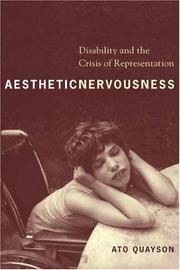
ISBN: 9780231139038 9780231139021 Year: 2007 Publisher: New York : Columbia University Press,
Abstract | Keywords | Export | Availability | Bookmark
 Loading...
Loading...Choose an application
- Reference Manager
- EndNote
- RefWorks (Direct export to RefWorks)
Focusing primarily on the work of Samuel Beckett, Toni Morrison, Wole Soyinka, and J. M. Coetzee, Ato Quayson launches a thoroughly cross-cultural, interdisciplinary study of the representation of physical disability. Quayson suggests that the subliminal unease and moral panic invoked by the disabled is refracted within the structures of literature and literary discourse itself, a crisis he terms "aesthetic nervousness." The disabled reminds the able-bodied that the body is provisional and temporary and that normality is wrapped up in certain social frameworks. Quayson expands his argument by turning to Greek and Yoruba writings, African American and postcolonial literature, depictions of deformed characters in early modern England and the plays of Shakespeare, and children's films, among other texts. He considers how disability affects interpersonal relationships and forces the character and the reader to take an ethical standpoint, much like representations of violence, pain, and the sacred. The disabled are also used to represent social suffering, inadvertently obscuring their true hardships.
82:316 --- Literatuursociologie --- 82:316 Literatuursociologie --- Abnormalities, Human, in literature --- Commonwealth literature (English) --- Diseases and literature --- People with disabilities in literature --- People with disabilities --- Handicapped in literature --- Physically handicapped in literature --- Literature and diseases --- Literature --- History and criticism --- Social conditions --- Beckett, Samuel, --- Coetzee, J. M., --- Morrison, Toni --- Soyinka, Wole --- شوينكا، وولي --- 渥雷・索因卡 --- Shoĭinka, Vole --- Soyinka, Akinwande Oluwole --- Wolei Suoyinka --- Coetzee, John M., --- Кутзее, Дж. М., --- Kutzee, Dzh. M., --- קוטזי, ג׳. מ., --- Кутзее, Джон Максвелл, --- Kutzee, Dzhon Maksvell, --- Pei-kʻo-tʻe, Sa-miao-erh, --- Beḳeṭ, Samuel, --- Beckett, Sam, --- Беккет, Сэмюэль, --- בעקעט, סאמועל --- בקט, סמואל --- בקט, סמואל, --- بكت، ساموئل --- Criticism and interpretation. --- Bikit, Sāmūʼil, --- Beckett, Samuel --- Coetzee, John Maxwell M. --- Coetzee, J. M. --- Coetzee, J.M. --- Coetzee, John M. --- Кутзее, Дж. М. --- Kutzee, Dzh. M. --- Кутзее, Джон Максвелл --- Kutzee, Dzhon Maksvell --- Wofford, Chloe Anthony --- Morrisonová, Toni --- מוריסון, טוני --- HANDICAP --- BECKETT (SAMUEL), 1906-1989 --- MORRISON (TONI), 1931 --- -COETZEE (JOHN MAXWELL), 1940 --- -SOYINKA (WOLE), 1934 --- -Invalides --- DANS LA LITTERATURE --- CRITIQUE ET INTERPRETATION --- Conditions sociales
| Listing 1 - 10 of 12 | << page >> |
Sort by
|

 Search
Search Feedback
Feedback About UniCat
About UniCat  Help
Help News
News